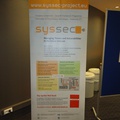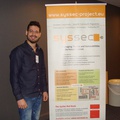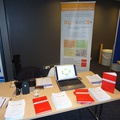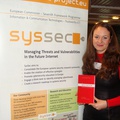Entries tagged ""
18 aug 2014
Postdoctoral Researcher Positions at FORTH
The Foundation for Research and Technology (FORTH) invites talented and motivated candidates with appropriate expertise to express their interest in the positions available in the project “Developing the foundations for modeling and analysis of spectrum markets” (CoRLAB), funded by a Research Excellence grant (GSRT/ΑΡΙΣΤΕΙΑ).
2 Positions of Postdoctoral Researcher
The work focuses on the analysis and assessment of wireless network markets and services. Topics include modeling the quality of experience of telecom services, analysis of incentives for adopting certain services/technologies, evaluation of partnerships between service providers and/or users, analysis of resource sharing mechanisms, assessment of the knowledge of quality of experience of a service on a market.
Require qualifications
B.Sc/B.S in Computer Science or in a related field
Ph.D. in Computer Science or in a related field
Completed military service (for male candidates)
In-depth understanding of wireless networks and communications (e.g., in the design and analysis of network systems)
Experience with EU projects (e.g., participation and proposal writing)
Knowledge of network economics
Good knowledge of programming
Employment
The successful postdoctoral candidate(s) will be offered a contract for one year.
Application
Interested parties are invited to submit their application by August
31st, 2014.
Their application should include the following documents:
Curriculum vitae (CV)
Copy of their academic diplomas/certificates
Letters of recommendation
Certificates of work experience
The application should be sent via email to Ms. Chrysoula Iliaki
(chrys@ics.forth.gr)
For more information about the position and the application, please
email to chrys@ics.forth.gr
More information about the technical aspects of CoRLAB can be found at:
https://www.ics.forth.gr/mobile/
10 jun 2014
PhD Studentship in Privacy-friendly Computation
PhD Supervisor: Dr G Danezis
Application Deadline: Friday, June 27, 2014
Applications are invited for a PhD position in the field of privacy enhancing technologies and cryptographic engineering at the Information Security Group of the UCL Department of Computer Science. The position is funded partly by Microsoft Research (MSR) and will be co-supervised by an MSR researcher.
We expect a candidate to have at least a strong 2:1 degree in Computer Science, Engineering, Mathematics or a related MSc course. A good engineering mathematics background and a willingness to become fluent with modern cryptographic constructions are necessary. A solid software engineering, compilers, or distributed systems background is desirable.
The successful applicant will study the engineering of tools and services to enable the wide deployment of privacy friendly computation techniques. A number of techniques in theoretical cryptography allow for computations to be performed on encrypted or otherwise obscured private data (including homomorphic encryption, secure multi-party computation and zero-knowledge proofs). The aim of this project is to make those techniques practical and usable by non-cryptographers. Key challenges include a thorough understanding of the cryptographic primitives, but most importantly engineering innovation through the creation of both infrastructures (web services, trusted parties) and tools (compilers, libraries, languages) that implement the theoretical techniques, and provide a usable interface for non-experts to use them.
How to Apply:
Please follow the link to the online application form here: https://prism.ucl.ac.uk/pgadmissions/apply/new?advert=66
You should mark the name of the studentship clearly on your personal statement.
The vacancy closing date is the 27th June 2014.
General enquiries about the application process should be directed to Melanie Johnson at melanie.johnson@ucl.ac.uk.
Questions regarding academic aspects of the project should be directed to George Danezis at g.danezis@ucl.ac.uk.
Funding Notes:
The studentship is open to all but only fully covers UK/EU fees. In addition a tax free stipend of £15,863 per year is provided.
07 mar 2014
Participation to the High Level Conference on the EU Cybersecurity Strategy
SysSec participated to the High Level Conference on the EU Cybersecurity Strategy, held in Brussels on 28th February, 2014. The conference discussed the progress achieved in the year after the publication of the EU Cybersecurity Strategy.
The event took place in the main hall of the Charlemagne building where a large foyer at the entrance was used for stands and posters. The SysSec consortium organized a booth to present the progress and outcomes of the project.
During the conference, the participants had the opportunity to learn about SysSec research activities and practice on how to use our AndroTotal web service for evaluating antivirus solutions in Android Market. Additionally, hard copies of the Red Book were distributed at the conference while we also gave the opportunity to anyone interested to provide a postal address for receiving a copy of the book in the future.
07 mar 2014
PhD Position in "Internet of Things and Big Data" at Chalmers
PhD Position in "Internet of Things and Big Data" at Chalmers University of Technology, Gothenburg, Sweden
Application deadline: April 15, 2014
https://www.chalmers.se/en/about-chalmers/vacancies/Pages/default.aspx?rmpage=job&rmjob=1963
As PhD student you will join the Networks and Systems division
and work at the intersection of Internet of Things (IoT) and Big Data
Analysis. The Internet of Things enables an increasing connectivity of
everyday devices and objects. These connected devices provide us with
new insights into our daily life and we rely on Big Data Analysis to
extract these insights. The overall aim of this PhD position is to
develop new mechanisms and applications for the Internet of Things and
combine these with Big Data Analysis to enable, for example, sustainable
living in future, smart cities. A special focus shall be put on
Internet of Things at metropolitan-scale, information security and privacy, near real-time data-stream analysis and energy-efficient networks.
Your major responsibility as a PhD student is to pursue your
own doctoral studies. You are expected to develop your own scientific
concepts and communicate the results of your research verbally and in
writing. The position generally also includes teaching on Chalmers'
undergraduate level or performing other duties corresponding to 20 per
cent of working hours.
To qualify as a PhD student, you must have a master's level
degree corresponding to at least 240 higher education credits in
Computer Science, Computer Engineering, or in a related discipline. As
for all PhD studies, a genuine interest and curiosity in the subject
matter and excellent analytical and communication skills, both oral and
written, are needed.
The ideal candidate for the position has a strong background
in distributed and networked systems. Further background in cyber
physical systems, information security, or data science is helpful. You
may apply even if you have not completed your degree, but expect to do
so before the position starts. Knowledge of Swedish is not a
prerequisite for applying since English is our working language for
research, and we publish internationally. Both Swedish and English are
used in undergraduate courses. Our researchers and PhD students at the
department come from more than 30 different countries.
Salary for the position is as specified in Chalmers' general
agreement for PhD student positions. Currently the starting salary is
26,250SEK per month before tax. The position is limited to a maximum of
five years. The position is intended to start in summer 2014, but a
different start could also be arranged.
Gothenburg is often referred to as the "heart of Scandinavia".
The video below gives an impression what it's like to live and study in
Gothenburg: https://youtu.be/0WrlGlSyS1c
Please see here for a detailed position description, contact details, and information on how to apply:
https://www.chalmers.se/en/about-chalmers/vacancies/Pages/default.aspx?rmpage=job&rmjob=1963
21 feb 2014
PhD Positions at Chalmers
5 Positions in Formal Methods, Functional Programming, and Information and Software/Web Security at the Department of Computer Science and Engineering, Chalmers University of Technology, Sweden
Application deadline: March 31, 2014
The positions are intended to start in autumn 2014, but an earlier start could also be arranged.
Job description
The Department of Computer Science and Engineering at Chalmers University of Technology invites applications for PhD positions in Formal Methods/Automated Reasoning, Functional Programming, and Information and Software/Web Security
1 PhD position in Formal Methods
The
PhD student will join the Formal Methods group and contribute to its
research on improving the quality of complex software systems. The
Formal Methods group of Chalmers is an internationally recognised
research group with a high-profile research track record and an
excellent network of collaborators. The group's research focus is in the
theoretical and practical aspects of formal software verification,
including automated reasoning, interactive theorem proving, runtime
verification, and test generation. Together with international
collaborators, the group members co-developed widely recognised
verification tools like KeY (www.key-project.org), Vampire
(https://vprover.org), ALIGATOR (mtc.epfl.ch/software-tools/Aligator),
and LARVA.
The research of the advertised PhD position will be in
the area of Software Verification, with a strong focus on the creative
use and development of automated reasoning techniques for software
verification. In particular, we are interested in designing and
combining new methods in automated first-order theorem proving,
satisfiability modulo theory solvers, symbolic computation, and program
analysis for the generation and verification of complex program
properties, such as invariants, interpolants, pre- and post-conditions.
Background in one or more of the following areas is expected: logic, formal methods, formal verification.
This
position will be supervised by Prof. Laura Kovacs in the frame of her
recently granted junior researcher project by the Swedish Research
Council. Laura Kovacs is the main developer of the ALIGATOR tool and the
co-developer of the world-leading theorem prover Vampire for
applications of program analysis and verification.
1 PhD Position in Functional Programming
The
PhD student will join the Chalmers Functional Programming (FP) Group,
one of the leading groups in the field. The Chalmers FP Group has a
strong interest in Embedded Domain Specific Languages, beginning with
their work on Lava for hardware design. The focus of the advertised
position is on returning to the problem of how to use Functional
Programming to support hardware design and deterministic parallel
programming.
We are particularly interested in the implementation
of cryptographic algorithms. Our favoured platform is the open source
Parallella board from Adapteva
(https://www.adapteva.com/parallella-board/), which combines Field
Programmable Gate Array (FPGA), two ARM cores and 16 or 64 cores
connected in a grid. This small board promises high performance, low
power computing, but the question of how best to program it is an
interesting one. The new PhD student will work on the use of Functional
Programming to enable programming of such highly parallel heterogeneous
systems.
The ideal candidate for the position in Functional
Programming will have a strong background in functional programming and
at least one of hardware design and parallel programming.
The PhD
student will be supervised by Prof. Mary Sheeran, who has long
pioneered the combination of hardware design and functional programming,
particularly working with her former students Koen Claessen and Satnam
Singh. The work will be closely connected to the SSF funded project on
Productivity and Performance through Resource Aware Functional
Programming (https://www.cse.chalmers.se/~ms/SSF10Final.pdf).
1 PhD Position in Information Security
The
PhD student will join the Chalmers Information Security group, working
in the area of information and communication security with a focus on
authentication problems in constrained settings. This is particularly
important for applications involving mobile phones, wireless
communication and RFID systems, which suffer from restrictions in terms
of power resources, network connectivity, computational capabilities, as
well as potential privacy issues. The overall aim of the announced PhD
position will be to develop nearly optimal algorithms for achieving
security and privacy while minimising resource use.
More
concretely, part of the research will involve the analysis and
development of authentication protocols in specific settings. This will
include investigating resistance of both existing and novel protocols
against different types of attacks, theoretically and experimentally. In
addition to investigating established settings, such as RFID
authentication, the research will also explore more general
authentication problems, such as those that arise in the context of
trust in social networks, smartphone applications and collaborative data
processing. This will be done by grounding the work in a generalised
decision-making framework. The project should result in the development
of theory and authentication mechanisms for noisy, constrained settings
that strike an optimal balance between reliable authentication,
privacy-preservation and resource consumption.
Experience in one
or more of cryptography, probability and statistics, decision and game
theory are beneficial. Mathematical maturity is essential.
The
PhD student will be supervised by Prof. Katerina Mitrokotsa and will
have the chance to collaborate with well-known researchers in the area
of information security. Some previous research related to this research
project can be found here: https://www.cse.chalmers.se/~aikmitr/ .
Katerina Mitrokotsa's research is currently funded by the European
Commission and the Chalmers ICT Areas of advance.
Regarding this
position application deadline is March 31, 2014 or until the position is
filled so please register your application today.
2 PhD Positions in Software/Web Security
The
PhD students will join a world-leading team of researchers on software
security. Software is often the root cause of vulnerabilities in modern
computing systems such as the web. By focusing on securing the software,
we target principled security mechanisms that provide robust protection
against large classes of attacks. The focus of the advertised positions
is on the following directions of work:
- To design rich
security policies for confidentiality, integrity and availability, as
demanded by practical applications (such as web and mobile
applications).
- To develop practical enforcement mechanisms for
these policies in expressive programming languages (such as web and
mobile languages). These enforcement mechanisms may combine static (for
example, static program analysis-based) and dynamic (for example,
run-time execution monitoring-based) techniques.
- To support the
above with case studies in web-application security. In pursuing these
goals, there are possibilities for collaboration with our high-profile
academic and industrial partners. We run a number of ambitious projects
with top international partners in academia and industry, including the
European project WebSand on web application security:
https://www.websand.eu/
These positions will be supervised by
Prof. Andrei Sabelfeld, recipient of a number of recent awards,
including SSF Advancement of Research Leaders award (2008), Chalmers
Research Supervisor of the Year (2010), and ERC Starter/Consolidator
(2012). Promotional video about the team's research on securing web
applications: https://vimeo.com/82206652
Details about Employment
PhD student positions are limited to five years and normally include 20 per cent departmental work, mostly teaching duties. Salary for the position is as specified in Chalmers' general agreement for PhD student positions. Currently the starting salary is 26,250SEK a month before tax. The positions are intended to start in fall 2014.
Suitable Background
Applicants
should have a Master's Degree or corresponding degree in Computer
Science, Computer Engineering, or in a related discipline. As for all
PhD studies, a genuine interest and curiosity in the subject matter and
excellent analytical and communication skills, both oral and written,
are needed.
You may apply even if you have not completed your
degree, but expect to do so before the position starts. Knowledge of
Swedish is not a prerequisite for applying since English is our working
language for research, and we publish internationally. Both Swedish and
English are used in undergraduate courses. Half of our researchers and
PhD students at the department come from more than 30 different
countries.
How to apply
The application should be written in English and include the following items:
1. An application of a maximum of one A4 page summarising your track record and providing your research statement
2. Attested copies of education certificates, including grade reports and other documents
3. Curriculum Vitae
4. Letters of recommendation and name of reference persons
5. Evidence of written work: research papers and theses
It
is important to include parts of your own work such as theses and
articles that you have authored or co-authored. Please notice also that
it is highly recommended that you include letters of recommendation; we
typically get a large number of applications, and it is not feasible for
us to request individual letters.
The application should be submitted electronically by March 31, 2014, at:
- for the position in Formal Methods: https://www.chalmers.se/en/about-chalmers/vacancies/?rmpage=job&rmjob=1911
- for the position in Functional Programming: https://www.chalmers.se/en/about-chalmers/vacancies/?rmpage=job&rmjob=1912
-
for the position in Information Security:
https://www.chalmers.se/en/about-chalmers/vacancies/Pages/default.aspx?rmpage=job&rmjob=1816
- for the positions in Software/Web Security: https://www.chalmers.se/en/about-chalmers/vacancies/?rmpage=job&rmjob=1913
The
selection of the specific research topic will take into account both
the interests of the new PhD student and the research agenda of the
respective group.
Contact persons for further information
Laura Kovacs <laura.kovacs@chalmers.se>, Formal Methods: https://www.cse.chalmers.se/~laurako/
Katerina Mitrokotsa <aikaterini.mitrokotsa@chalmers.se>, Information Security: https://www.cse.chalmers.se/~aikmitr/
Andrei Sabelfeld <andrei@chalmers.se>, Software/Web Security: https://www.cse.chalmers.se/~andrei/
Mary Sheeran <mary.sheeran@chalmers.se>, Functional Programming: https://www.cse.chalmers.se/~ms/
The Department
The Department has about 70 faculty members and enrols about 90 PhD students from more than 30 countries. The research spans the whole spectrum, from theoretical foundations to applied systems development. There is extensive national and international collaboration with academia and industry all around the world. For more information, see https://www.chalmers.se/cse/EN/ .
Gothenburg, Sweden
Gothenburg
is often referred to as the "heart of Scandinavia". The videos below
give an impression what it's like to live and study in Gothenburg.
Live in Gothenburg: https://youtu.be/sbwVIQeGcdY
Study in Gothenburg: https://youtu.be/0WrlGlSyS1c
13 feb 2014
Teaching position at Stevens Institute of Technology
The Computer Science Department at Stevens Institute of Technology invites applications for a non-tenure-track teaching position beginning in August 2014. The position is expected to be at the assistant professor level. However, outstanding applicants at other levels may also be considered.
Applicants are expected to have a Ph.D. in Computer Science or a closely related field; either record or promise of being an outstanding teacher; and ability to improve our curriculum. Duties will include classroom teaching (mostly at the undergraduate level), student advising, curriculum development, and participation in Institute service activites. Opportunities for online teaching and curriculum development may also be available.
To be successful, a candidate should be technically up to date; energetic, articulate and engaging; able to teach applied subjects that involve program development and system building; and able to contribute to efforts for laboratory development, course and program innvovation, etc.
Stevens Institute of Technology is a private university located in Hoboken, New Jersey. The 55-acre campus is on the Hudson river across from midtown Manhattan within a few minutes from NYC via public transportation. Hoboken is an upscale small city, the residence of choice for many professionals working in NYC. Faculty live in Hoboken, Manhattan, and in suburban communities in Northern New Jersey along commuter train lines to Hoboken and NYC. Stevens' location offers excellent opportunities for collaborations with nearby universities such as NYU, Princeton, Columbia, and Rutgers/DIMACS as well as major industrial research laboratories such as Bell Labs, AT&T Labs, IBM Research, Google New York, Siemens, and the Sarnoff Corporation.
Applications should include a curriculum vitae, a statement of teaching interest/expertise, and at least three references. PDF is preferred for all application materials and reference letters.
Please apply at
https://www.stevens.edu/compsci/search/index_t.php
Review of applications will begin immediately.
12 feb 2014
Post-doc position on mobile platform security
The Secure Systems group at the University of Helsinki and Aalto University is looking for a postdoctoral researcher with expertise in platform security.
About the position
Securing end systems such as mobile devices, laptops and servers is critical in the design of any distributed system. The basis for end system security are the security enablers at the hardware, operating system and middleware levels and their effective inter-operation.
The postdoctoral researcher selected for this position will have the opportunity define the research agenda in this research theme together with Prof. Asokan. The position is initially for one year. But as this area is one of the two main thrusts for the group, the appointment can be extended by another 1-2 years for the right candidate.
The selected candidate can join the group as soon as possible.
Qualifications
- you have a solid background and hands-on experience various aspects of platform security: you are familiar with one or more of the following technologies: trusted execution environments, hardware security, OS design principles, OS virtualization, mobile platform security architectures.
- you have prior research experience in some aspect of OS or hardware security as evidenced by your publications in top notch system security venues.
- you are excited about applying these skills to solve practical problems.
- you are eager write code and run experiments to test your ideas.
If you are interested in this opportunity, drop a message to Prof. Asokan at asokan@acm.org with your current CV and a description of why you think you fit this position.
13 jan 2014
PhD Position in Information Security at Chalmers University of Technology
We are looking for an excellent PhD candidate to work in
the area of information and communication security with a
focus on authentication problems in constrained settings.
This is particularly important for applications involving
mobile phones, wireless communication and RFID systems,
which suffer from restrictions in terms of power
resources, network connectivity, computational
capabilities, as well as potential privacy issues. The
overall aim of the project will be to develop nearly
optimal algorithms for achieving security and privacy
while minimising resource use.
More concretely, part of the research will involve the
analysis and development of authentication protocols in
specific settings. This will include investigating
resistance of both existing and novel protocols against
different types of attacks, theoretically and
experimentally. In addition to investigating established
settings, such as RFID authentication, the research will
also explore more general authentication problems, such as
those that arise in the context of trust in social
networks, smartphone applications and collaborative data
processing. This will be done by grounding the work in a
generalised decision-making framework. The project should
result in the development of theory and authentication
mechanisms for noisy, constrained settings that strike an
optimal balance between reliable authentication,
privacy-preservation and resource consumption. Some
previous research related to this research project can be
found here: https://lasecwww.epfl.ch/~katerina/Publications.html
Qualifications
Applicants for the position shall have a Master’s Degree
or corresponding in Computer Science, Mathematics,
Information Security and Cryptography or in a related
discipline. A master's degree in information security and
cryptography is a bonus.
Experience in one or more of cryptography, probability and
statistics, decision and game theory are beneficial.
Mathematical maturity and excellent written and oral
English skills are essential.
Application deadline: January 31, 2014
We offer:
Full-time temporary employment. The position is limited to
a maximum of five years.
How to Apply
Electronic application can be submitted following the
Apply button below.
For questions, please contact:
Research: Katerina Mitrokotsa,
Assistant Professor,
Department of Computer Science and Engineering,
Networks and Systems Division,
aikmitr@chalmers.se
Location
Gothenburg, Sweden
Gothenburg is often referred to as the "heart of
Scandinavia". The videos below give an impression what
it's like to live and study in Gothenburg.
Live in Gothenburg: https://youtu.be/sbwVIQeGcdY
Study in Gothenburg: https://youtu.be/0WrlGlSyS1c
16 dec 2013
Postdoctoral Researcher in Network Security at ETH Zurich
The network security group lead by Adrian Perrig at ETH in Zurich is
seeking to fill a postdoctoral researcher position in the general area
of network security to work on the SCION next-generation Internet
architecture. The candidate will collaborate with a group of 10
committed researchers on the design, analysis, implementation, and
evaluation of a next-generation Internet system. The starting date is
negotiable (but the sooner the better) and the position is for 1-3
years.
More information about the SCION next-generation Internet architecture:
https://www.netsec.ethz.ch/research/projects/scion
More information about the network security group:
https://www.netsec.ethz.ch/
Aim and Scope
In the SCION project we are designing and building a prototype for a
highly available and secure next-generation Internet architecture. We
are researching a multitude of issues, including: DDoS defense, trust
establishment, censorship resilience, user privacy and anonymous
communication, economic aspects, reliability, high performance and
scalable networking systems, etc. The goal of the project is to
design, build, and deploy a highly available and viable
next-generation Internet architecture.
Candidate Profile
The ideal candidate should have an PhD in CS, EE, or related
discipline, and combine a solid theoretical background with strong
systems building skills.
The following skills are advantageous:
- Security, applied cryptography, and networking.
- Strong publication track record in security or applied cryptography.
- Interests in systems design, analysis, simulation, implementation,
and evaluation.
- Knowledge of economic aspects of networking.
- Familiarity with ISP operations.
- Experience with real-world deployments.
- Formal protocol analysis.
- Design and analysis of security protocols.
- Experience with low-level programming and debugging.
Application and Inquiries
Interested candidates should send their CV to Adrian Perrig
<aperrig@inf.ethz.ch>. Questions about the position may be
sent to the same address.
Location
The position is at ETH in Zurich, Switzerland. Knowledge of German is
not required as Zurich is an international city. CS courses at ETH are
taught in English, and English is spoken almost exclusively throughout
the department, as well as in meetings, talks, etc. Although Zurich is
a highly desirable place to live in, the generous remuneration more
than adequately compensates for the high cost of living.
See entries by:
News by month:
- April 2015
- August 2014
- June 2014
- March 2014
- February 2014
- January 2014
- December 2013
- July 2013
- May 2013
- January 2013
- November 2012
- October 2012
- September 2012
- July 2012
- April 2012
- February 2012
- January 2012
- December 2011
- November 2011
- September 2011
- August 2011
- July 2011











 The research leading to these results has received funding from the
European Union Seventh Framework Programme (FP7/2007-2013) under grant agreement no 257007.
The research leading to these results has received funding from the
European Union Seventh Framework Programme (FP7/2007-2013) under grant agreement no 257007.